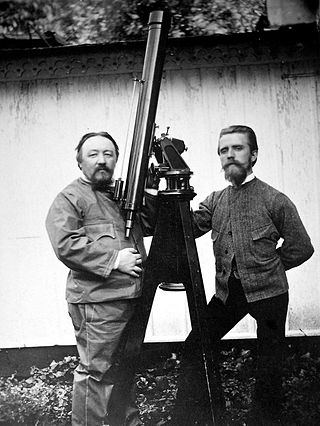See also
- Karl Wilhelm Reinmuth (1892–1979), also known as Karl William Reinmuth, German astronomer
- Karl Williams (born 1971), US American football player
Karl William (born 1995) is a Danish musical artist.
Karl William may also refer to:
The year 1892 in science and technology involved some significant events, listed below.
Karl Wilhelm Reinmuth was a German astronomer and a prolific discoverer of 395 minor planets.
The year 1979 in science and technology involved some significant events, listed below.
Gruber is a German surname from Austria and Bavaria, referring to a person from a geological depression, mine, or pit. It is the most common surname in Austria.
Illyria is a historical region in Southeastern Europe, inhabited in antiquity by the Illyrians.
Metzger is a German/Yiddish (German-Jewish) occupational surname, meaning "butcher". Notable people with the name include:
Langer is a surname originally of German origin. For the etymology, meaning, and pronunciation of the name, and for the Hiberno-English slang word, see Wiktionary.
939 Isberga is a background asteroid from the inner asteroid belt near the region of the Flora family. It was discovered from Heidelberg on 4 October 1920 by Karl Wilhelm Reinmuth. As was his common practice, Reinmuth gave the asteroid a feminine name without reference to any specific person.

950 Ahrensa, provisional designation 1921 JP, is a stony Phocaea asteroid and slow rotator from the inner regions of the asteroid belt, approximately 15 kilometers in diameter. It was discovered on 1 April 1921, by German astronomer Karl Reinmuth at Heidelberg Observatory in southern Germany.
955 Alstede is a minor planet orbiting the Sun.
Adam is a surname.
Witte are Dutch and Low German surnames meaning "(the) white one". Witte can also be a patronymic surname. Notable people with the surname include:
Wiegand is a German surname. It originated from the Old High German verb wîgan, meaning to fight, through the past participle form wîgant, meaning the fighter. The word comes from wîg (battle/war). The name was in use by the Middle Ages, also as a first name.
Baer or Van Baer is a surname. Notable people with the surname include:
Comet 30P/Reinmuth, also known as Comet Reinmuth 1, is a periodic comet in the Solar System, first discovered by Karl Reinmuth on February 22, 1928.

Heidelberg-Königstuhl State Observatory is a historic astronomical observatory located near the summit of the Königstuhl hill in the city of Heidelberg in Germany. The predecessor of the current observatory was originally opened in 1774 in the nearby city of Mannheim but degradation of observational conditions there resulted in a relocation to the Königstuhl in 1898.

Hermann Kobold was a German astronomer.
1944 Günter, provisional designation 1925 RA, is an asteroid from the inner regions of the asteroid belt, approximately 5 kilometers in diameter.

44P/Reinmuth or Reinmuth 2 is a Jupiter-family comet that is greatly perturbed by the gas giant Jupiter. The diameter of this comet is estimated at 3.22 km and its absolute magnitude at 11.
Karl Scharnweber in Rostock is a German church musician, Jazz musician and composer.